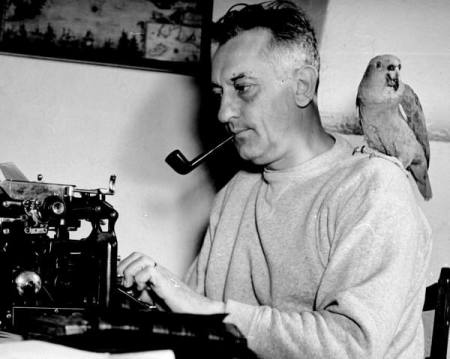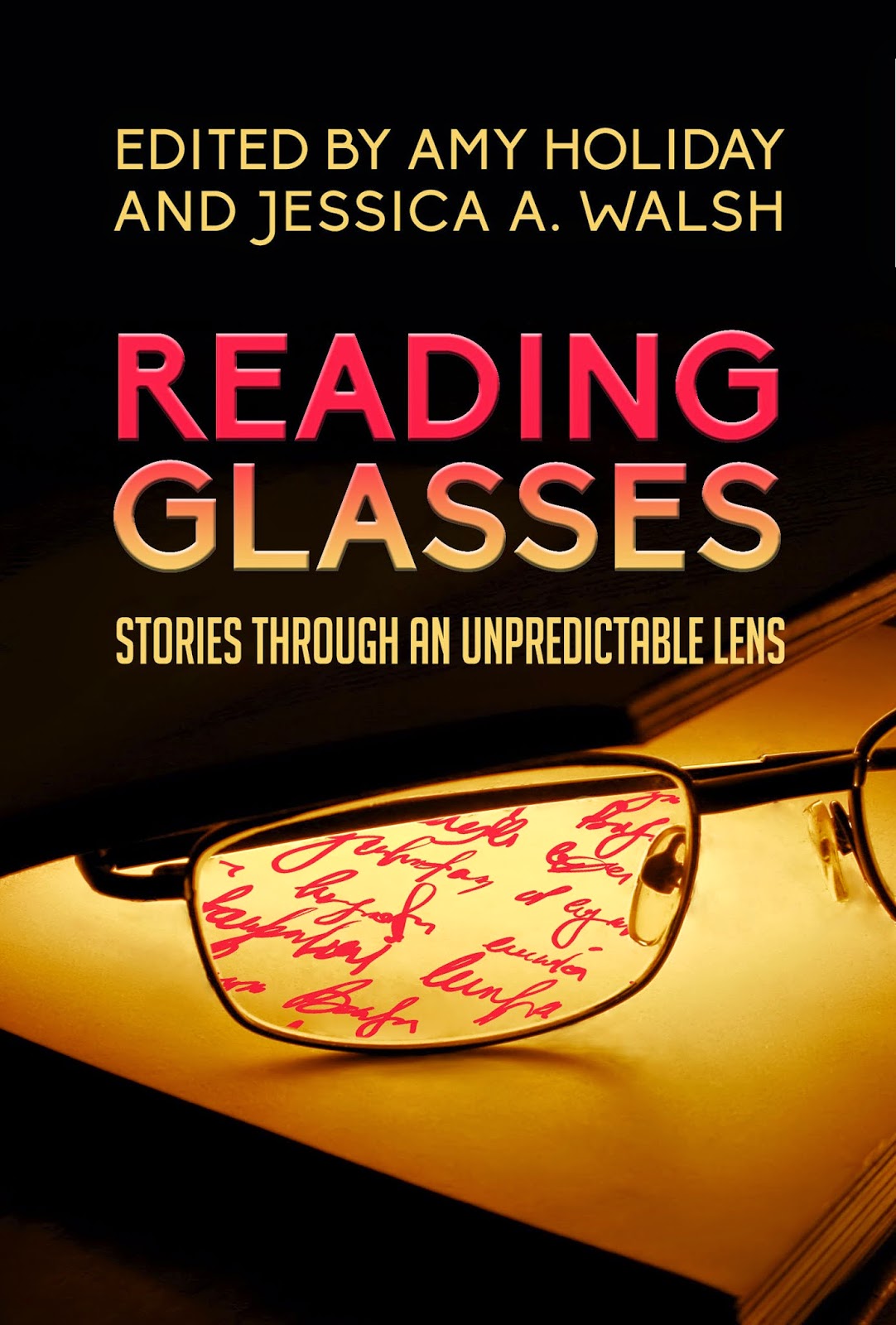
When I took a graduate class called “Writing the Novel” a few years ago, I learned two very important things. First, if you tell a woman that she’s writing a romance novel when she thinks she’s writing literary fiction, be prepared to see a chair fly across the room. Second, there’s something called “A Contract with the Reader.” Let’s forget about throwing chairs for a while and focus on the contract, which was something I had never heard of before.
Let’s pretend you’re in a bar and a guy sitting to your left says, “You want to hear a story?” Of course you don’t, but you say, “Sure. Thrill me.” He knows sarcasm, so he says, “Tell you what. If I give you a four-sentence setup, and you agree that you’re interested in hearing the rest, then you owe me a beer. How’s that?” So of course, you say, “Sure. Thrill me.” So he says:
A lonely, 13-year old boy lives with his single mom in a trailer park and has a quiet place in the woods nearby where he feels safe from everyone else. One afternoon, when his mom is working late, he goes to his place in the woods where he falls asleep until dark. He wakes frightened from an incredibly strange dream and starts walking home. Usually he snaps his fingers to break the silence because he’s afraid of the dark, but when he snaps his fingers this night, a painless but warm, candle-like flame comes from the end of his finger.
I don’t know about you, but those four sentences would have cost me at least one beer or as many as it would take for him to tell me the rest of the story, mainly because it begs for questions. What was the dream about? Was it really a dream? What is producing the flames? How is the dream connected to the flames? What will he do now? Is it like a super power? Why is he lonely? What kind of kid is he? How will this change him? Questions are important. Without wanting to know more, there's not reason to continue reading. That's why I like to end my chapters with little teases. Yeah, I'm a tease.
To be clear, that setup was written by another student in the same graduate class as the chair-throwing romance writer. Would love to take credit for it, but I can’t.
The storyteller in the bar has just created a contract, and I am the reader. He has said to me, “If you’re willing to hang in there for about 80,000 words, I promise I will deliver a story that explains everything.” As the reader, I have the ability to accept the agreement, which means read the story, or not accept, which means I keep browsing the shelves or wait for another guy to show up on the barstool on the right who might have a better story.
Sometimes we accept the contract that turns out to be worth every penny. Whether it was 2000 pennies for the book or the beer doesn’t matter, as long as you get a story that delivers on its promise. Sometimes we accept the contract, but the story doesn’t deliver. Even if you wanted, you won’t get your money back. Worse than that, you won’t get the time back either. Those 75,000 words are stuck in your head, and you will probably search right away for another story to wash the memories away. It was a bad contract and should never have been offered to you, but there’s no way you could have known without someone having warned you. You don’t usually get that in books or movies, but it sure is needed.
One of my favorite examples of a bad contract is Secret Window with Johnny Depp, based on a story by Stephen King. It’s got a four-sentence setup that’s so good you would be willing to buy the guy on your left a case of beer if the story worked out. If you don’t know the story, the setup would go like this:
Mort Rainey, a successful writer who recently split with his wife, retreats to a lakeside cabin to work on his next book but gets a mysterious visitor. John Shooter, an angry man from Mississippi, insists that Mort has plagiarized his short story. Although a typed copy of the man’s story is nearly word for word with the version Mort had published, Mort has printed proof that he wrote the story first. Mort tries to ignore the man and hopes he’ll go away, but bad things start happening, like a house burning down, friends getting killed, and each bad thing gets closer and closer to Mort.
Sounds like a pretty good setup, right? Begging for questions? How did they write the same story without knowing each other? Who really wrote it first? Is there some way one could have accidentally gotten it from the other? How far will this stranger go in tormenting Mort?
You, like me, would probably have been okay with buying a few beers, maybe even a case, if the guy on the barstool would give you a good 70 or 75,000 words and bring it all together. However, this is a contract you should not sign. And if you haven’t seen the movie and don’t want to know the rest, you should stop after the next paragraph.
Secret Window is an excellent example of a broken contract. The stranger, John Shooter, convinces both himself and the audience that Mort stole his story, and the consequences to Mort’s refusal are swift and strong. Both the local sheriff and Mort’s lawyer investigate, and more lives are threatened and lost. When Mort confronts his ex-wife’s new boyfriend about his involvement, he learns that the boyfriend stems from a town in Tennessee called Shooters Bay. The coincidences grow, as do the close calls, some of which are deadly. Wanna know how it ends?

Split personality. John Shooter is really some kind of stupid alter-ego of Mort. We’re supposed to believe that the divorce had shaken Mort so much that he developed another personality that turned around to terrorize himself. Apparently, when we hear Shooter talk to Mort on the phone, the voice is imaginary – I guess. Oh, they did some interesting things to plant clues, such as when Mort thinks shooter has broken into his house and, when Mort thinks he’s about to clobber him with a bat, it turns out to be a mirror. That’s supposed to be a clever way of foreshadowing that Mort is really Shooter, but it’s kind of lame. The only thing more lame would have been if it had all been a dream. That's the worst ever. Or maybe the "deus ex machina" is worse, when an unseen force, usually referred to as "the hand of God," reaches down and saves the day. For that, you might check out Stephen King's The Stand, in which after hundreds of pages and a final standoff between the good guys and Satan in a denim jacket, nuclear missiles are launched, only to be saved by a "mysterious" hand that rendered them harmless.
It is an unfair and misleading contract, and it is something you should consider when you are writing a story. What exactly are you offering the reader? Imagine you are the guy on the barstool to my left. Thrill me. Set up a story that makes me want to buy you a beer, and I will gladly listen to all 80,000 words. However, you better bring it all together with a resolution that takes every loose end and ties them all into neat bows as if it’s my birthday present. If you don’t, you might want to head for the door when my last beer bottle is just about finished because, like that woman with the chair in my graduate class, I just might tomahawk an empty one in your direction. So watch your back.

Mort Rainey, a successful writer who recently split with his wife, retreats to a lakeside cabin to work on his next book but gets a mysterious visitor. John Shooter, an angry man from Mississippi, insists that Mort has plagiarized his short story. Although a typed copy of the man’s story is nearly word for word with the version Mort had published, Mort has printed proof that he wrote the story first. Mort tries to ignore the man and hopes he’ll go away, but bad things start happening, like a house burning down, friends getting killed, and each bad thing gets closer and closer to Mort.
Sounds like a pretty good setup, right? Begging for questions? How did they write the same story without knowing each other? Who really wrote it first? Is there some way one could have accidentally gotten it from the other? How far will this stranger go in tormenting Mort?
You, like me, would probably have been okay with buying a few beers, maybe even a case, if the guy on the barstool would give you a good 70 or 75,000 words and bring it all together. However, this is a contract you should not sign. And if you haven’t seen the movie and don’t want to know the rest, you should stop after the next paragraph.
Secret Window is an excellent example of a broken contract. The stranger, John Shooter, convinces both himself and the audience that Mort stole his story, and the consequences to Mort’s refusal are swift and strong. Both the local sheriff and Mort’s lawyer investigate, and more lives are threatened and lost. When Mort confronts his ex-wife’s new boyfriend about his involvement, he learns that the boyfriend stems from a town in Tennessee called Shooters Bay. The coincidences grow, as do the close calls, some of which are deadly. Wanna know how it ends?

Split personality. John Shooter is really some kind of stupid alter-ego of Mort. We’re supposed to believe that the divorce had shaken Mort so much that he developed another personality that turned around to terrorize himself. Apparently, when we hear Shooter talk to Mort on the phone, the voice is imaginary – I guess. Oh, they did some interesting things to plant clues, such as when Mort thinks shooter has broken into his house and, when Mort thinks he’s about to clobber him with a bat, it turns out to be a mirror. That’s supposed to be a clever way of foreshadowing that Mort is really Shooter, but it’s kind of lame. The only thing more lame would have been if it had all been a dream. That's the worst ever. Or maybe the "deus ex machina" is worse, when an unseen force, usually referred to as "the hand of God," reaches down and saves the day. For that, you might check out Stephen King's The Stand, in which after hundreds of pages and a final standoff between the good guys and Satan in a denim jacket, nuclear missiles are launched, only to be saved by a "mysterious" hand that rendered them harmless.
It is an unfair and misleading contract, and it is something you should consider when you are writing a story. What exactly are you offering the reader? Imagine you are the guy on the barstool to my left. Thrill me. Set up a story that makes me want to buy you a beer, and I will gladly listen to all 80,000 words. However, you better bring it all together with a resolution that takes every loose end and ties them all into neat bows as if it’s my birthday present. If you don’t, you might want to head for the door when my last beer bottle is just about finished because, like that woman with the chair in my graduate class, I just might tomahawk an empty one in your direction. So watch your back.






